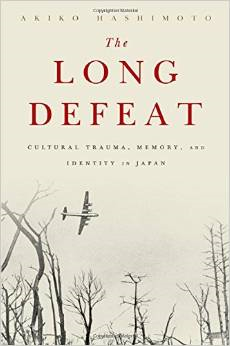The Long Defeat: Cultural Trauma, Memory, and Identity in Japan
In The Long Defeat: Cultural Trauma, Memory, and Identity in Japan (Oxford University Press 2015), I explore the stakes of war memory in Japan after its catastrophic defeat in World War II, showing how and why defeat has become an indelible part of national collective life, especially in recent decades. Divisive war memories lie at the root of the contentious politics surrounding Japan's pacifist constitution and remilitarization, and fuel the escalating frictions in East Asia known collectively as Japan's "history problem." Drawing on ethnography, interviews, and a wealth of popular memory data, this book identifies three preoccupations - national belonging, healing, and justice - in Japan's discourses of defeat. I uncover the key war memory narratives that are shaping Japan's choices - nationalism, pacifism, or reconciliation - for addressing the rising international tensions and finally overcoming its dark history.
Reviews
"A major achievement, theoretically and empirically, The Long Defeat exposes startling fractures in Japanese identity that will affect regional and global politics for decades to come. Timely and empathic, this is also a deeply disturbing book."
-Jeffrey C. Alexander, Lillian Chavenson Saden Professor of Sociology, Yale University
"World War II is no longer a lived experience for the vast majority of people. But in East Asia today the politics of war memory are more divisive than ever. The Long Defeat is must reading for anyone seeking to understand why. With a deeply grounded comparative perspective, Akiko Hashimoto offers a searching and compassionate analysis of the way people in Japan have dealt with the traumatic memory of war over the long postwar decades."
-Andrew Gordon, Lee and Juliet Folger Fund Professor of History, Harvard University
“The Long Defeat should be mandatory reading for those interested in understanding contemporary Japanese society and for scholars studying war memory more generally. Hashimoto should be praised for so carefully weaving together disparate parts of the war memory debate in Japan”
-Memory Studies
"By drawing from a wide body of sociological and historical methodologies, Hashimoto offers us a clear and jargon-free assessment of the intellectual and political battles that continue long after the war ended, particularly in the years spanning the 1990s through the 2010s. The book will be of great value to those who are interested in understanding how societies and states grapple with "cultural traumas"... Hashimoto has built the groundwork for new ways to understand war memory in Japan. Other scholars might take up the baton and employ her methodologies in more deeply place-specific studies."
-H-Net Reviews, H-War
"The Long Defeat is no doubt a significant achievement. This is a must-read volume for scholars and students of memory studies. The book is theoretically solid and empirically rich. Theoretically, Hashimoto's thorough reading of social memory literature is skillfully matched up with trauma theory, providing a compelling theoretical framework.
Empirically, each analytical chapter has original data, deepening our understanding of Japan's memory politics. The book is also rich in Japanese sources, which also makes it a valuable read for the students of Japanese identity politics."
-Contemporary Sociology
"The Long Defeat is a sweeping analysis of Japanese memory from virtually every angle--political, cultural, and personal--across the span of postwar history. There is hardly anything else like it. It is an essential contribution to the scholarly literature as well as an exceptionally compelling read."
-Jeffrey Olick, Professor of Sociology and History, University of Virginia
“Akiko Hashimoto’s The Long Defeat is a masterly analysis of these developments from the 1990s until the present. This book is a must-read for anyone interested in the issues of historical debate, public memory, and mourning for the war dead in Japan. Hashimoto sensitively engages in a careful cross-referencing of these discussions in Japan with those taking place in other countries including Germany - probably the state most most comparable to Japan in terms of its wartime history as an aggressor nation and its postwar struggle with the legacies of the past.”
-Sven Saaler, Journal of Japanese Studies
"In this timely, poignant, and eminently readable volume, Hashimoto examines Japan's continuing "history problem". Working with a wide trove of primary material--movies, television, newspapers, documentaries, interviews, oral histories, textbooks--she concludes that there is no coherent or unified narrative of the war from a Japanese perspective. Summing Up: Essential."
-CHOICE
"...a valuable contribution to the burgeoning recent literature on "collective memory." Yet it thoughtfully disputes the usefulness of that notion, arguing instead that cultures have competing, incongruent memories of their traumatic pasts and that this is especially important for understanding the contest of memories in contemporary Japan."
-American Journal of Sociology
"The Long Defeat is a book that details how the memories of violent conflict shape culture. Hashimoto presents her readers with a compelling case that is theoretically sophisticated and empirically rigorous. The book should be considered by anyone interested in collective memory, national identity, World War II, or Japanese history."
-Social Forces
“In The Long Defeat, sociologist Akiko Hashimoto masterfully examines the texture of this enduring memory work in contemporary Japan as the task of “repairing the moral backbone of a broken society. … The Long Defeat is a highly accessible book on Japan in the period since 1985 that should be of interest to a wide popular audience. Free of academic jargon and disciplinary literature reviews, it has just the right amount of references to Western memory theorists and Japanese social critics to anchor the argument in the academic discourse.”
-Franziska Seraphim Monumenta Nipponica
